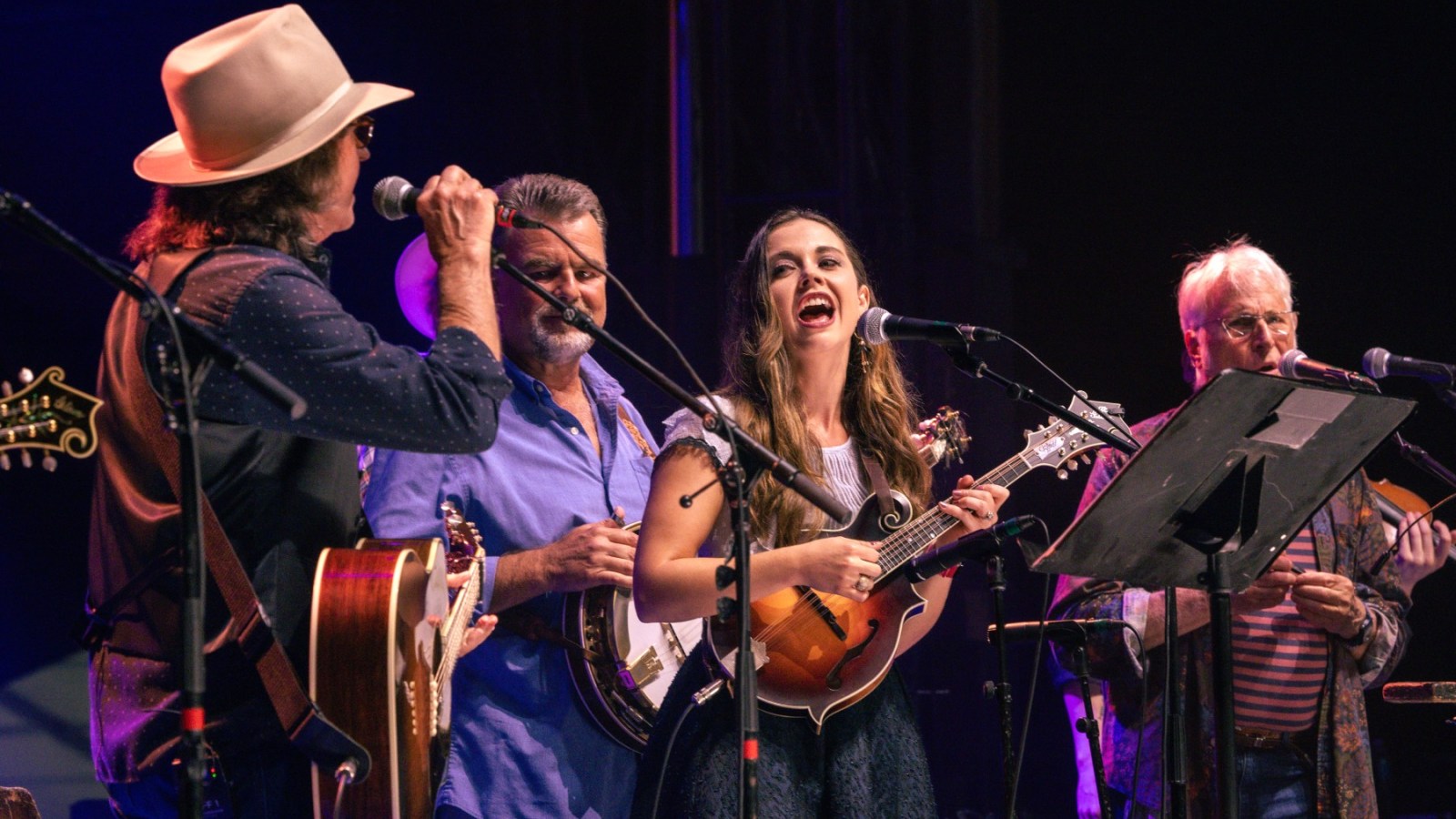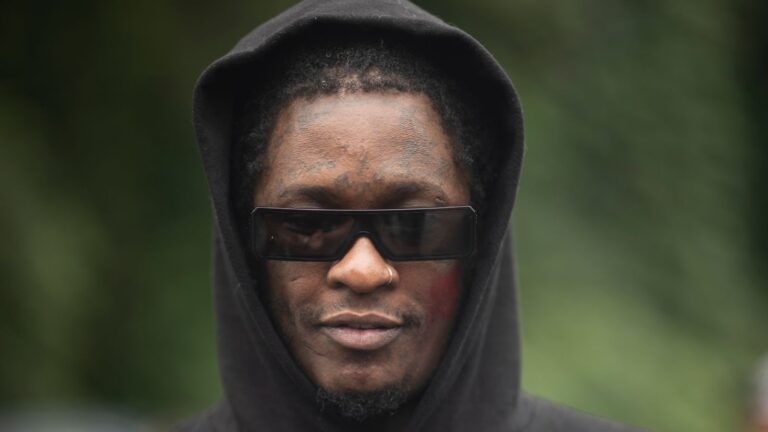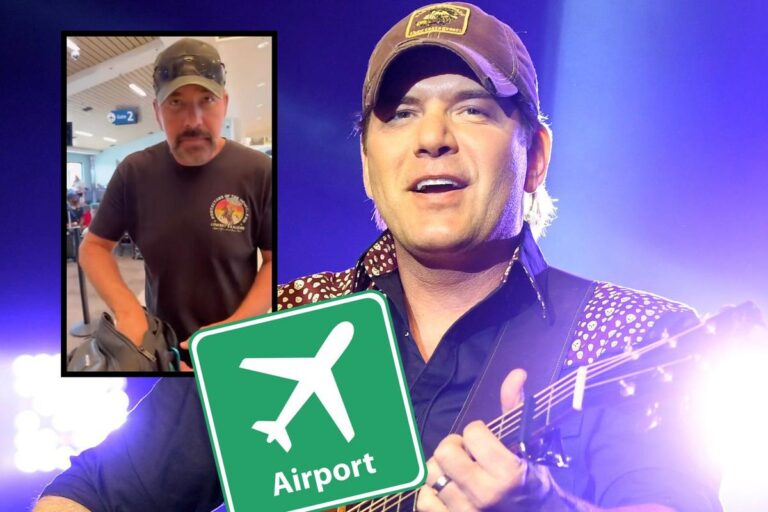Underneath a fingernail moon and the silhouettes of the Blue Ridge Mountains of Western North Carolina, Oliver Wood stood onstage at the Earl Scruggs Music Festival and declared, “This one goes out to Earl.”
The Wood Brothers’ lead singer then delivered a moving version of “Postcards from Hell,” off their 2008 album Loaded. It was just one of many poignant highlights at the annual celebration of string music and of its pioneers, the late bluegrass picker Scruggs.
Held at Tryon International, an equestrian center and event facility near Scruggs’ hometown of Shelby, the yearly gathering also featured Alison Krauss & Union Station (featuring Jerry Douglas), Del McCoury Band, Watchhouse, the War and Treaty, Nitty Gritty Dirt Band, Sam Bush, Sierra Hull, and the Earls of Leicester.
“If there was no Earl Scruggs, there would probably be no Union Station,” Krauss tells Rolling Stone backstage. “Without the banjo, I don’t think bluegrass would be what it is. It’s the sound of America, and the way he played it is what made it all so infectious that people couldn’t get enough.”
In December 1945, Scruggs burst onto the national scene when he first appeared on the Grand Ole Opry alongside the “Father of Bluegrass,” Bill Monroe, who recruited the young banjoist to be part of his new band and revolutionary sound. With a three-finger banjo-picking technique, known today as “Scruggs Style,” Scruggs was the spark to the fire that Monroe was looking to set ablaze with bluegrass music.
“The key to Earl’s lasting legacy is the type of musician he was, the innovator he was,” says Mary Beth Martin, executive director of the Earl Scruggs Center in Shelby. “And how he was willing to push all the boundaries of music genres and collaborating with anyone. That continues to resonate even today.”
In the 1950s and 1960s, after leaving Monroe to go out on his own, Scruggs became a household name as part of the highly successful bluegrass act Flatt & Scruggs. Until his death in 2012 at 88, Scruggs remained curious and inspired, often meandering effortlessly into numerous rock, blues, and jazz circles. He was always looking for new artists to not only play with, but also perhaps pick something up in the process — all in contrast to the tightly-held ethos of bluegrass purists.
“Earl left his door open to everybody, and I have the same attitude,” Jerry Douglas says of Scruggs’ influence. “He loved playing with younger musicians, which is important for any new generation to learn where [bluegrass] came from.”
One of the key components of the festival resides in its workshops for young, aspiring musicians, which includes the Junior Appalachian Musicians showcase. JAM is a popular program offered to elementary school students around Western North Carolina.
“The most amazing thing is when I meet young musicians who completely revere Earl,” Martin says. “And we see little pieces of Earl all over the festival, whether it’s attendees wearing shirts with his face on it or celebrating every time ‘Foggy Mountain Breakdown’ is played live.”
The event also offered a slew of homegrown talent from across the musically-rich landscape of the region, including Town Mountain, Fireside Collective, Darren Nicholson Band, Holler Choir, Songs from the Road Band, Zoe & Cloyd, Unspoken Tradition, and Laura Boosinger.
For Town Mountain, who originated just up Interstate 26 in Asheville, the Scruggs appearance was their last local performance following the recent announcement of their impending hiatus this fall. After 20 years of perfecting their rollicking, honky-tonk sound in venues across America, the group is pulling the plug, and their fans have been offering an outpouring of appreciation in response.
“The love we’ve received is humbling and amazing,” Greer says. “We love to play, and we wish our last show was in Asheville. But the poetic ending for us comes from the fact that we’re a road band and our last gig is on the road.” (They’ll wrap up their live career in October in the Philadelphia suburbs.)
On Saturday afternoon, the “Healing the Hollers” set put a spotlight on the upcoming one-year anniversary of Hurricane Helene. The aftermath of the storm decimated large swaths of Western North Carolina and killed 108 people. One year later and there’s still much to process — music plays a big part in that healing.
“I ain’t mad at the river/Because it showed me what to be,” Asheville singer-songwriter Lance Mills sang while backed up by bluegrass act Unspoken Tradition. “But I can’t get back what it took from me.”
For Mills, the memories of Helene are raw and real. During the storm, he lost his home in the floodwaters. Thankfully, he and his family were able to find safe refuge on the roof of the house as it floated away from its foundation. Since then, they’ve bounced around the area while awaiting the rebuilding process of their home, which broke ground this week.
“It’s wonderful to get to play music with my friends,” Mills says of the Scruggs set. “And it’s really good for me to express some of the tragedy and try to turn something painful into something beautiful.”
Later that evening, mandolinist Sam Bush emerged on the Flint Hill stage. For Bush, the legacy of Scruggs resides not only in his willingness to push the envelope of his craft, but his compassion for humanity through music.
“He inspired me to have an open mind,” Bush says. “To be open to all kinds of music and all kinds of people.”
The Nitty Gritty Dirt Band closed out the festival on Sunday evening with a special tribute to their groundbreaking 1972 album Will the Circle Be Unbroken. The opus remains a melodic bridge between the old-school and the progressive realms of bluegrass and country music, whether it be within musical circles or simply as humans trying to find common ground amid turbulent times. The record itself prominently featured Scruggs, a central figure who bridged many gaps between genres and people.
“We can play [bluegrass], we can honor it, but I also just try to do what I do, and try to be me,” says Sierra Hull. “And try to let that part of myself shine through, without feeling like I’ve got to be something else, because that’s what [Earl] did. That’s why I love [this music] so much.”
Presenting an all-star “cast of characters,” Nitty Gritty was joined by Hull (performing as Mother Maybelle Carter), Shawn Camp (Jimmy Martin), Rob McCoury (Earl Scruggs), Sam Bush (Roy Acuff), and Jerry Douglas (Norman Blake).
“There’ll be guitars and fiddles/Earl Scruggs and his banjo too,” Camp rang out on “Grand Ole Opry Song.” “Bill Monroe singing out them ole Kentucky Blues.”
“Earl was a hero of ours way before we met him. His virtuosity and innovation was incredibly inspiring to us as budding musicians,” says the Dirt Band’s Jeff Hanna. “He was always so supportive and encouraging, confident, but never arrogant. He left a huge, beautiful legacy.”



